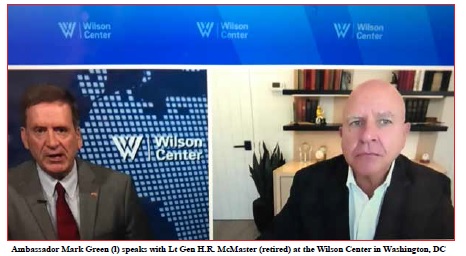At Washington’s Wilson Center, Lt Gen H.R. McMaster Speaks on US Withdrawal from Afghanistan
By Elaine Pasquini

(This interview was conducted prior to the announcement of additional US troops being deployed to help evacuate/protect American diplomats.)
Lt Gen H.R. McMaster (ret), former US national security advisor, author of Battle Grounds: The Fight to Defend the Free World and currently a senior fellow at Stanford University’s Hoover Institution in Palo Alto, California, was the featured guest at the Wilson Center in Washington, DC on August 12.
Ambassador Mark Green, president, director and CEO of the Wilson Center, conducted the interview which focused on the implications of the withdrawal of US forces from Afghanistan, which precipitated the Taliban’s swift-moving takeover of large swaths of the country this month, and the regional consequences of these actions.

In an August 2 op-ed in the Wall Street Journal, McMaster wrote: “An American priority must be preventing the collapse of the Afghan government to prevent the Taliban and its partners from re-establishing a base to prepare attacks on the US and its allies.” He urged the Biden administration to provide air support for Afghan forces, ensure that the country's air force has contractor maintenance and logistic support based in Afghanistan and provide extensive intelligence, surveillance and reconnaissance support.
Had the US taken these steps, McMaster opined, the Taliban probably would not have taken control of 65 percent of the country. This happened because the US stopped actively targeting the Taliban in Afghanistan during “the capitulation negotiations” under Ambassador Zalmay Khalilzad, special envoy and negotiator in peace talks with the Taliban in Doha, he said. “After the agreement was signed, we were hands off with the Taliban. We are honoring a peace agreement that actually was only gained after concession after concession.”
Lamenting the potential loss of the gains made over the past 20 years, particularly for women and girls, following the demise of the Taliban regime in 2001, McMaster asked, “Where are the people in the Biden administration who were the authors of the Right to Protect doctrine after we stood idly by in a genocidal campaign in Rwanda? I would imagine they were in on the decision about the complete withdrawal from Afghanistan. We are watching the Afghan people pay the price.”
Explaining why support cannot be provided from a distance – from bases in Qatar or elsewhere – the former national security advisor explained that counter-terrorism operations were more than a targeting exercise because sometimes targets are intermingling with civilian populations in cities. “We can’t just drop 2,500-pound bombs when we identify a Taliban target and not have any regard for the civilian causalities,” he said. “You have to be on the ground. Freedoms…are at risk and are actually being reversed now by the Taliban’s gains in Afghanistan.”
McMaster went on to argue that Americans did not realize how small of a contingent the US had there, the relatively little amount of money it cost to sustain that effort and how much burden-sharing was occurring with other coalition partners in Afghanistan.
Blasting the Biden administration and past US administrations for mishandling the war in Afghanistan, he explained, “Insurgencies start when the opposition senses weakness. When you announce years in advance exactly the number of troops you are going to have and what they are going to do and not do is ridiculous. We talked ourselves into defeat in Afghanistan. We had a sustainable commitment and we were engaged in a worthwhile mission. And it was a mission that was grounded in our interests and in the interests of all humanity.”
A destabilization of the region with a flood of refugees to neighboring countries is a major concern for McMaster. “We need to prevent the worst from happening…a collapse in Pakistan that would give jihadist terrorists access to the most destructive weapons on earth,” he warned. “Security in Pakistan is inexorably connected to what happens in Afghanistan.”
Because of the gains that have been made for women and girls and freedom of expression and of the press, McMaster predicted the Taliban’s governance would be even more brutal than it was 20 years ago. “This is why a very small amount of support by us over the years was sufficient to prevent what we see happening today from happening.”
“If you want to look at whether or not we were winning back then, look at what is happening in Afghanistan now,” McMaster concluded. “Was it worth it with that relatively small effort to prevent what is happening now? I would say the answer to that has to be hell, yes, it was!”
-----------------------------------------------------------------------------
Back to Pakistanlink Homepage

